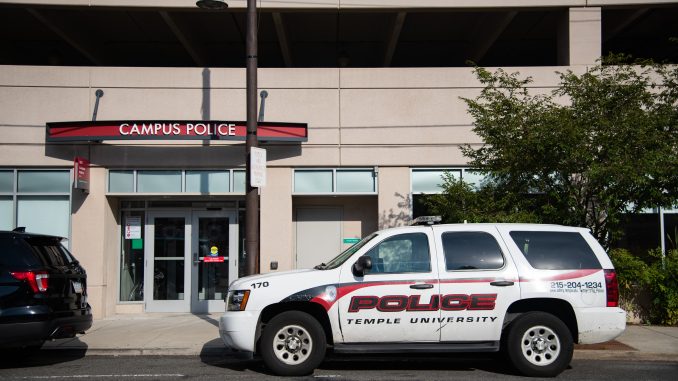
With law enforcement agencies nationwide facing calls for increased accountability, Temple University’s police department is conducting a “holistic” self-evaluation of its policies and practices as part of the university’s anti-racism initiative.
“It’s a little bit more, to a certain extent, philosophical,” said Joe Garcia, deputy chief of administration of Campus Safety Services. “Everything that pertains to law enforcement that we know we either have control over or we can make better, then that’s what we want to do.”
As part of the self-evaluation, members of Campus Safety Services’ leadership meet weekly to compare their policies against the policing standards outlined in former President Barack Obama’s 21st Century Task Force on Policing final report, which Temple considers the “gold standard” of guidelines for modern policing.
The self-evaluation is one of the eight actions Temple is taking to promote anti-racism education and programming in its $1 million anti-racism initiative, which was announced on Sept. 16 amid local and national efforts to combat racial injustice, The Temple News reported.
Campus Safety Services began the self-evaluation about three months ago, said Charles Leone, director of Campus Safety Services. Around that time, Temple also advocated for state and local policing agencies to adopt the 21st Century Task Force on Policing’s recommendations in an announcement addressing racism in the Temple community.
The 21st Century Task Force on Policing categorized their 59 recommendations and 92 action items into six “pillars” of recommendations and a seventh for implementing them. The pillars include practices for improving the relationship between police and local communities and ways to increase public trust in policing policies, according to the report.
For example, the 21st Century Task Force on Policing’s final report recommends police adopt a “guardian” mindset to build public trust and legitimacy, and establish a culture of transparency and accountability.
“We want our neighboring community that we work with every day to be proud of us and how we do things,” Leone said.
Temple Police’s evaluation does not currently include input from local residents, Leone wrote in an email to The Temple News.
Other members of the evaluation team include inspector Jeffrey Chapman, captain Enoch McCoy, captain Barry McFadden, deputy chief of operations Denise Wilhelm and captain Edward Woltemate.
Campus Safety Services is considering ways to implement recommendations from the report’s third pillar, which focuses on how police can use social media and technology to improve trust in policing. For example, Campus Safety Services plans to purchase 110 body cameras for its police officers by the end of 2020, Leone said.
Temple’s police department has not previously used body cameras and is modeling its initiative on the Philadelphia Police Department 22nd District’s use of them, Leone wrote in an email to The Temple News. The 22nd District, which encompasses Main Campus, was the first of the Philadelphia Police Department’s districts to have officers wear body cameras, with most other districts following suit in 2017.
Another pillar of the 21st Century Task Force on Policing’s final report provides recommendations for promoting the wellness and safety of police officers. Campus Safety Services has not begun discussing this pillar yet, but Chapman hopes to discuss how they can help their officers monitor their own mental health, he said.
The evaluations will also examine the training practices and policies in place at the Temple University Police Academy, Garcia said.
Garcia is confident many of Temple’s current policing practices already meet the standards outlined in the 21st Century Task Force on Policing final report, he said.
“We think that we’re at that point already,” Garcia said. “But we’re looking at it from humble eyes and with a lot of characters to try and come up with it even better.”
Campus Safety Services is still in the early phases of the self-evaluation and is unsure when it will be completed, Garcia added.
“It’s not like there’s a magic wand,” Chapman said. “It’s not just a snap of the finger and then boom, here’s the changes.”
Once the self-evaluation is complete, Campus Safety Services will present its findings to the university and then answer questions from Valerie Harrison, senior advisor for equity, diversity and inclusion, and the group she is leading to oversee the implementation of the anti-racism initiative, Leone said.
In addition to the self-evaluation, Campus Safety Services is simultaneously completing the final phase of its accreditation process through the Commission on Accreditation for Law Enforcement Agencies, Leone said.
To receive CALEA accreditations, police agencies voluntarily complete a self-assessment, an on-site assessment conducted by CALEA assessors and a review conducted by the CALEA committee, according to CALEA’s website.
Campus Safety Services must go through this process every three years to maintain its accreditation, Garcia said.
“It’s more of the administrative stuff,” Garcia said of the accreditation. “The 21st Century Policing is what we’re doing out in the street, the practicality of policing.”
This is Campus Safety Services’ second time going through the accreditation process, after beginning its first CALEA accreditation in May 2014, The Temple News reported.
“It is a progressive department, so we’ve always tried to stay with best practices,” Garcia said.


Be the first to comment